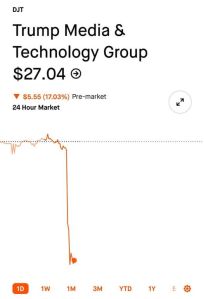Mostly Monday Reads: Supreme Court Upends the Constitution, Again
Posted: April 15, 2024 Filed under: just because | Tags: @repeat1968, American Requiem Beyonce, Bill of Rights, Black Lives Matter protests, Corrupt Supreme Court Justices, John Buss, Mckesson v. Doe, Right to Assemble, Stormy Daniels Hush Money Trial, Trump stock crashing 8 Comments
“So it begins, a proud moment in our history. Another trump first. MAGA.” John Buss @repeat1968
Good Day, Sky Dancers!
I’m moving a little slow today. I woke up to Temple snuggled utterly beside me. She usually sleeps down by my feet. She stood up, looking like she was trying to assume the position, then darted off the bed. Fortunately, she got down there. I spent the wee hours of the morning cleaning up the floor. She seemed much better when we went for our morning walk, but dawn is always too early for me. I’m used to lecturing and gigging at night.
I did check the phone. BB had texted me this. It totally changed my thoughts about what I share with you today. Of course, I’d planned on covering one of the most historical trials in history, and we’ll get to that. I’m not sure this excitement will start until after the jury is seated. However, it’s Trump, and who knows what the overgrown toddler will do. So, back to the matter at hand. This is from Vox’s Ian Millihiser. “The Supreme Court effectively abolishes the right to mass protest in three US states. It is no longer safe to organize a protest in Louisiana, Mississippi, or Texas.”
This is especially key down here. #SCOTUS just decided that there is basically no right to protest in Louisiana, Texas, and Mississippi. Welcome to the first massive step to undoing democracy. That follows up well with what the Louisiana D’ohvenor just did. If you see a peaceful protest, and it’s in your way, just slam the pedal to the floor and run right over them. That crime is allowed, but if someone sabotages your protest by throwing a rock. All bets are off, and the organizers pay for all damage. Here are just some of those headlines. “Louisiana could outlaw protests near residences, despite First Amendment concerns.” This was written just 5 days ago when there were First Amendment Concerns. Then there is this. “New legislation aims to offer protection to drivers who hit protesters that are performing road-blocking maneuvers. “GOP politicians across the US are proposing increased penalties for demonstrators who run onto highways and legal immunity for drivers who hit them.”

Baton Rouge, 2016. Jonathan Bachman/Reuters. This evidently isn’t protected speech now.
So, forced birth advocates can do whatever shenanigans they want and be protected by some warped take on religious freedom and freedom of speech. The rest of us may be liable for things others did that take away our freedom and strip us of all our assets. This is from Ian’s analysis.
The Supreme Court announced on Monday that it will not hear Mckesson v. Doe. The decision not to hear Mckesson leaves in place a lower court decision that effectively eliminated the right to organize a mass protest in the states of Louisiana, Mississippi, and Texas.
Under that lower court decision, a protest organizer faces potentially ruinous financial consequences if a single attendee at a mass protest commits an illegal act.
It is possible that this outcome will be temporary. The Court did not embrace the United States Court of Appeals for the Fifth Circuit’s decision attacking the First Amendment right to protest, but it did not reverse it either. That means that, at least for now, the Fifth Circuit’s decision is the law in much of the American South.
For the past several years, the Fifth Circuit has engaged in a crusade against DeRay Mckesson, a prominent figure within the Black Lives Matter movement who organized a protest near a Baton Rouge police station in 2016.
The facts of the Mckesson case are, unfortunately, quite tragic. Mckesson helped organize the Baton Rouge protest following the fatal police shooting of Alton Sterling. During that protest, an unknown individual threw a rock or similar object at a police officer, the plaintiff in the Mckesson case who is identified only as “Officer John Doe.” Sadly, the officer was struck in the face and, according to one court, suffered “injuries to his teeth, jaw, brain, and head.”
Everyone agrees that this rock was not thrown by Mckesson, however. And the Supreme Court held in NAACP v. Claiborne Hardware (1982) that protest leaders cannot be held liable for the violent actions of a protest participant, absent unusual circumstances that are not present in the Mckesson case — such as if Mckesson had “authorized, directed, or ratified” the decision to throw the rock.
Indeed, as Justice Sonia Sotomayor points out in a brief opinion accompanying the Court’s decision not to hear Mckesson, the Court recently reaffirmed the strong First Amendment protections enjoyed by people like Mckesson in Counterman v. Colorado (2023). That decision held that the First Amendment “precludes punishment” for inciting violent action “unless the speaker’s words were ‘intended’ (not just likely) to produce imminent disorder.”
The reason Claiborne protects protest organizers should be obvious. No one who organizes a mass event attended by thousands of people can possibly control the actions of all those attendees, regardless of whether the event is a political protest, a music concert, or the Super Bowl. So, if protest organizers can be sanctioned for the illegal action of any protest attendee, no one in their right mind would ever organize a political protest again.

Demonstrators marching in the street holding signs during the March on Washington, 1963 [Source: Library of Congress]
The case is one with which the justices were already familiar. In 2019, the U.S. Court of Appeals for the 5th Circuit allowed the officer’s lawsuit to go forward. Mckesson then appealed to the Supreme Court, where he argued that the lawsuit against him was barred by the First Amendment and the Supreme Court’s 1982 decision in NAACP v. Claiborne Hardware Co., which limited the NAACP’s liability for a nonviolent protest that it organized.
In November 2020, the court sent the case back to the 5th Circuit with instructions to seek guidance from the Louisiana Supreme Court on whether state law would in fact allow Mckesson to be held liable.
After the Louisiana Supreme Court issued an opinion indicating that, under the facts alleged by the officer, a protest leader could be sued for negligence, a divided 5th Circuit issued a new opinion allowing the lawsuit to go forward. Doe had alleged, the majority wrote, that Mckesson had “organized and directed the protest in such a manner as to create an unreasonable risk that one protester would assault or batter” the officer.
Judge Don Willett dissented from the panel’s ruling. He agreed that Doe “deserves justice” and should be able to sue the person who actually injured him. But he rejected the idea that Doe can sue Mckesson, arguing that the theory on which the majority relied was “foreclosed — squarely — by the Constitution and Supreme Court precedent.”
Mckesson returned to the Supreme Court last fall, asking the justices to weigh in. But after considering the case at seven consecutive conferences, the justices denied review.
Justice Sonia Sotomayor penned a statement regarding the court’s decision to deny review. She noted that since the court of appeals issued its decision, the Supreme Court in Counterman v. Colorado “made clear that the First Amendment bars the use of an objective standard like negligence for punishing speech, and it read Claiborne and other incitement cases as demanding a showing of intent.” Because the Supreme Court may turn down cases “for many reasons,” Sotomayor stressed, the denial of review in Mckesson’s case “expresses no review about the merits of” his claim. Moreover, she added, the court of appeals should “give full and fair consideration to arguments regarding Counterman’s impact in any future proceedings in this case.”

Demonstrator at the Vietnam Moratorium, 1969 [Source: Library of Congress]
As with all Trump Trials, the days before the trial began, we had more Trumpertantrums. This is from Nick Robertson writing for The Hill. “Trump rages at judge hours before hush money case begins.”
Former President Trump railed against the judge in his criminal hush money case early Monday, just hours before the first criminal trial against a former U.S. president is set to begin.
Repeating complaints he has made for months, Trump argued that Judge Juan Merchan is corrupt and the charges against him are political in nature and baseless, and he dubbed the entire effort a “witch hunt.”
“The Radical Left Democrats are already cheating on the 2024 Presidential Election by bringing, or helping to bring, all of these bogus lawsuits against me, thereby forcing me to sit in courthouses, and spend money that could be used for campaigning, instead of being out in the field knocking Crooked Joe Biden, the WORST President in the History of the United States,” he wrote in one early morning Truth Social post. “Election Interference!”
Trump’s criminal hush money trial will start jury selection Monday in Manhattan, where prosecutors claim the former president illegally covered up payments made to hide a previous affair during the closing days of the 2016 presidential campaign.
Trump also again denounced the gag order placed against him, which was expanded after he berated Merchan’s wife and daughter in prior social media posts.
“I want my VOICE back. This Crooked Judge has GAGGED me. Unconstitutional!” Trump wrote. “The other side can talk about me, but I am not allowed to talk about them! Rigged Trial!”
It is unclear if Trump will testify during the trial, though he is expected to attend it in person, including Monday’s session.
 Sorry, dude, if you protest too much and damages result, you will have to pay for everything. Ask your SCOTUS buddies. The New York Times has live updates on its website today.
Sorry, dude, if you protest too much and damages result, you will have to pay for everything. Ask your SCOTUS buddies. The New York Times has live updates on its website today.
As the first criminal trial of an American president headed toward jury selection on Monday, the judge overseeing the case against Donald J. Trump once again declined to step aside, and prosecutors sought to punish the former president for possibly violating a gag order.
Before beginning the arduous process of choosing a jury for the landmark trial — on allegations that Mr. Trump falsified documents to cover up a sex scandal involving a porn star — the judge announced his decision to remain on the case, rejecting Mr. Trump’s latest effort to oust him.
Michael Tomasky has this delightful headline at The New Republic. “We May Finally Get to Write: “Convicted Felon Donald Trump.” The former president’s lawlessness has dodged many an obstacle over the years, but he’s facing a new challenge now: a jury of his peers.” Tomasky asks my favorite question, and I am paraphrasing. How the fuck does Trump get away with all of this continually?
We’re finally here. This week, Donald Trump will sit in a courtroom and face criminal charges. The courtroom has not been kind to Trump this year: A Manhattan jury found the Trump Organization guilty on 17 counts of tax fraud last December, and E. Jean Carroll won that hefty judgment against Trump for sexual abuse, but these were civil proceedings. So mark this down as the week the criminal justice system finally managed to haul Trump before the bar of justice.
The only real question here is why this took so long. It’s not as if it wasn’t obvious in 2015 that Trump had total contempt for the law. That was easy for all to see. How has he gotten away with it for this long?
It’s partly due to an utterly docile Republican Party, whose leaders know very well that Trump’s a brigand but are afraid to say so. It’s partly Trump’s reliance on an old Roy Cohn legal strategy—delay, deny, accuse the other side of what you yourself have done, conjure up totally fictional defenses that should be laughed out of court but at least slow down the proceedings. And conservative judges have played their role, such as Aileen Cannon and the U.S. Supreme Court.
But crucially, this is also a media story—more precisely, it’s the story of our two medias, the mainstream and the right-wing. The mainstream media have consistently held Trump to a lower standard of behavior than other politicians, and the right-wing media have held him to no standard of behavior, making excuses for everything.
It’s so important to understand this phenomenon. We have two medias in this country. One wakes up every morning looking for a fight, and the other, with some exceptions, wakes up every morning looking for nuance and rationalizations. It’s a huge part of the story of how we got here.
Take this now completely forgotten tale from the very early days of the Trump administration. On January 24—Trump’s fourth day in office—then–national security adviser Mike Flynn was interviewed by the FBI about his Russia connections. On January 26 and 27, Sally Yates of the Justice Department told the White House about her department’s suspicions about Flynn.
That same night of January 27—the first week of his presidency—Trump had dinner with then–FBI director James Comey. The FBI was investigating Flynn. It was also, we learned shortly thereafter, investigating Trump’s 2016 campaign.
What was said at that dinner? We don’t know everything, but that May, Trump admitted that he asked Comey if he, Trump, was under investigation. The mere asking of the question, as Lawrence Tribe said at the time, was a high crime and misdemeanor—an attempt to intimidate and to obstruct justice.
That should have launched a congressional investigation at the very least. But the Republicans controlled the House at the time, so that wasn’t going to happen. In fact, then-Speaker Paul Ryan came out and called Comey compromised, backing Trump all the way.
And the media? Oh, it was a story all right, I wouldn’t deny that it was. But while I haven’t done a content analysis, I’d bet you that Bill Clinton’s tarmac visit with Loretta Lynch inspired more outrage in both medias than this episode did. Naturally, I’m not defending what Clinton did. But he was an ex-president with no power over Lynch. Trump was the sitting president will all power over Comey—which he exercised that May by firing him.
This is one of dozens of examples in which Trump flagrantly violated norms and standards. It made a little stink for a moment or two, but it eventually faded away, quietly departing the front pages, blending into the blurry background of half-remembered Trumpian lies and outrages that have proven to be too numerous for the media watchdogs to actually keep track of, leaving one feeling overwhelmed.
That’s why this week is different. This, finally, is a court of criminal law. There will be facts submitted for the record. There will be testimony, under oath. And eventually, in an estimated six weeks or so, there will be a verdict from a jury of Trump’s peers.

 Let’s hope just does, in fact, prevail. I’m not a lawyer, so I must listen to them. However, I should know about equities, as I’ve never seen anything like this before.
Let’s hope just does, in fact, prevail. I’m not a lawyer, so I must listen to them. However, I should know about equities, as I’ve never seen anything like this before.
I have no words about this last move on DJT stock other than, what is wrong with NASDAQ and the people holding this stock? It already has a negative P/E ratio, and you want to further decimate shareholder value? At the very least, it’s unethical, but is this legal? This is from CNBC. Kevin Breuninger has the analysis. “Trump Media shares plunge more than 15% after company files to issue additional DJT stock.” This plan sounds fishy and appears based on allowing Trump to cash out when allowed. The use of warrants here is legal but off. People need to dump this stock quickly and learn a lesson or fifty.
Shares of Trump Media plunged more than 15% on Monday after the company filed to issue millions of additional shares of stock.
Trump Media’s dramatic slide came as Donald Trump sat in a Manhattan courtroom for the start of his criminal trial on hush money-related charges. Trump is the majority stakeholder in the company.
Trump Media, which created the Truth Social app and trades under the stock ticker DJT on the Nasdaq, fell nearly 20% last week.
Since the company began public trading on March 26, its share price has fallen more than 62%, from an opening price of $70.90 that day down to around $27 on Monday.
As a result, its market capitalization has been slashed by nearly $6 billion, leaving it at around $3.7 billion as of Monday.
The company’s intent to issue more common stock was disclosed in a preliminary prospectus filed with the Securities and Exchange Commission.
The shares cannot be issued until a registration statement with the SEC takes effect.
The filing describes a plan to offer more than 21.4 million shares of common stock, issuable “upon the exercise of warrants,” the filing shows. Stock warrants give their holder the ability to buy shares at a predetermined price within a certain time frame.
Trump Media predicted in the filing that it will receive “up to an aggregate of approximately $247.1 million from the exercise of the Warrants.”
The closing price of Trump Media’s warrants was $13.69 as of Friday, according to the filing. The warrants are being traded on the Nasdaq under the ticker “DJTWW.” That ticker was down more than 8% as of 11 a.m. ET.
The company also seeks to offer the resale of up to 146.1 million shares of stock from “selling securityholders,” 114.8 million of which are held by Trump himself. Trump owns 78.8 million shares of the company, and stands to obtain 36 million “earnout shares” if the stock stays above $17.50 for enough trading days.
Trump’s current stake in the company — nearly 60% of its shares — was worth more than $2.2 billion at Monday morning’s share price. Trump is not allowed to sell his shares until a six-month lockup period expires.
So, another week under the glare of the Orange Crashing Meteor. Please let all of this end so we can return to being the country we should be.
What’s on your reading and blogging list today?





And Happy French Quarter Fest!
Thank you for writing about the SCOTUS shit …I am not only disgusted. I am even more scared for the future.
Used to be they where the only branch of government you could actually trust. Now they are the last. Clarence Thomas didn’t even show up for work today. Guess since he gets his walking orders while he sees what his summer vacation plans are about anyway.
https://www.theguardian.com/us-news/2024/apr/15/clarence-thomas-absent-supreme-court
One good thing, Trump was told he’d be arrested if he didn’t show up daily.
Trump Judge Merchan Warns Of Arrest If Trump Disrupts Or Skips Hush Money Trial
https://www.forbes.com/sites/brianbushard/2024/04/15/trump-judge-merchan-warns-of-arrest-if-trump-disrupts-or-skips-hush-money-trial/?sh=16b6caa5297b
“Merchan then warned the former president that he could also face an arrest warrant if he skips his trial without a reason—a statement given to defendants in New York known as the Parker Warning.
Earlier on Monday, Merchan refused to rule on Trump’s request to skip the trial on Wednesday for his son Barron Trump’s high school graduation, with Merchan saying that decision “really depends on if we are on time and where we are in the trial.”
Trump fell asleep in court today. He looked awful. He’s probably having trouble sleeping. I hope he’s completely miserable!
Isn’t that yet another symptom of organic impairment? (I mean the falling asleep in a very inappropriate way.)
In the earlier photos he’s trying on his dumb scowl. It’s like his sense of “design” which someone called a poor man’s idea of a rich man’s house.
His scowl is a wimp’s idea of Attila the Hun.